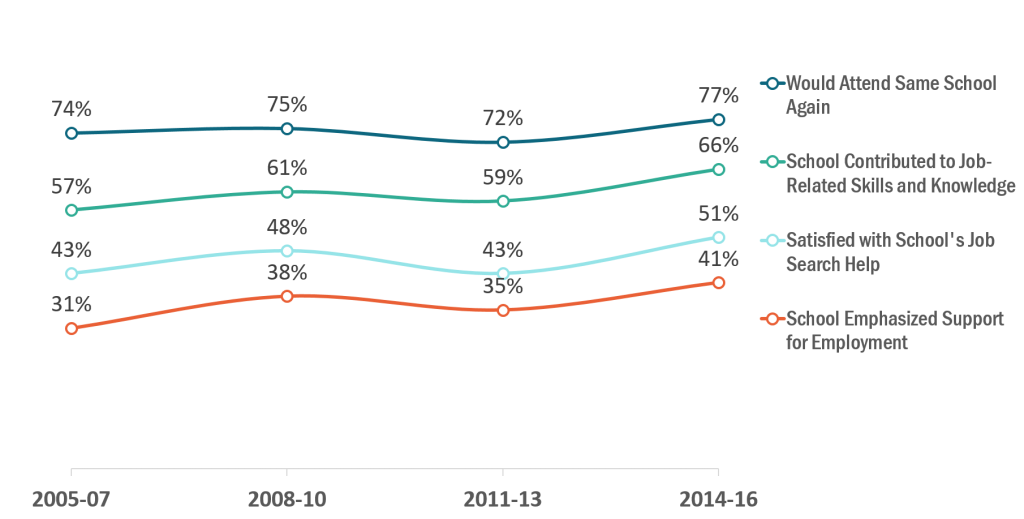Guest Post by Stephen Daniels
Senior Research Professor
American Bar Foundation
Be True to Your School was a popular song of an earlier time extolling staunch loyalty to one’s alma mater. But staunch loyalty to your law school these days in light of high tuition, high student debt, concerns about inadequate preparation, and mediocre job prospects? Two recent reports drawing from retrospective surveys of graduates done by Gallup – one as a part of the Gallup-Purdue Index and the other done in conjunction with AccessLex Institute – suggest that many see little value in their legal education given the cost. Those choosing to attend law school make a substantial investment with the expectation of a substantial return. Is there value in the proposition? Is there cause to be true to your school?
I do research on legal education from an institutional perspective and the question about value animates much of my current work involving law students.[1] Students – or more precisely, their tuition dollars – are indispensible for legal education. The LSSSE survey data allow me to explore students’ views over time in search of an answer for that question.
The LSSSE data are important because they provide not just information about students, but information from students. Simply put, the surveys give voice. The data are especially unique because they are longitudinal, the surveys asking students a host of questions over time using the same wording – the gold standard for examining change, or the lack thereof, in views, attitudes, or assessments.
Although the data do not cover all schools, and LSSSE does not claim to have a representative sample of all schools or students, the range of participating schools is wide. The number of respondents in any given year or set of years is large. The 2016 survey, for example, had over 18,000 respondents from 72 schools; in 2010 the figures were just under 23,500 from 73 schools.
My current project using the LSSSE data – Be True to Your School: But True to Your Law School? – explores patterns and changes in law student assessments of their schools. The question about being true to one’s school provides a framework, a heuristic for exploring a range of factors important to students given the investment they are making. In that old song, what made you true to your school was its winning football team. What makes a law student true to their school is the school’s success in meeting their expectations – enough, to paraphrase a LSSSE survey question, that the student would attend that school again if given the choice.
The data I utilize cover the years 2005 through 2016. They include respondents from 38 schools participating in the LSSSE surveys at least three times between 2005 and 2010, and at least three times between 2011 and 2016 (allowing for comparisons before and after the 2010 enrollment peak and subsequent decline). Focusing on those 38 schools—which were not identified, just as the students themselves remain anonymous—provides a reasonable degree of continuity. Not all respondents from those schools are included, just those at the end of their law school experience (usually 3Ls and occasional part-time students who take a fourth year (4Ls) to complete their studies). Structured this way the data set consists of 33,661 survey respondents.
Are 3/4Ls at least reasonably true to their schools? In apparent contrast to the Gallup surveys, preliminary analyses suggest yes – at least in general. Most respondents said they (probably or definitely) would attend the same school again.
Affirmative Answers to Select LSSSE Questions by Time Period
(3/4L respondents in 38 schools)

Additionally, the percentages reflect some stability over time with regard to attending the same school again. The 2011-13 dip reflects the cohort graduating as the post-2010 enrollment declines began, with the next cohort having a somewhat more positive view. It was the effect of a drop in affirmative responses from private school students (from 75% in 2008-10, to 69% in 2011-13). There was no similar decline for public schools (81% in 2011-13, 85% in 2014-16 to 80%). Not surprisingly, the most important factor for an affirmative answer about attending the same school again was a student’s evaluation of their overall law school experience.[2]
While attending the same school is a summary question close to the Gallup surveys’ interest in value, other LSSSE questions probe the idea of value more deeply and are more revealing of the complexities of students’ views. One question asks the extent to which the law school contributed to acquiring work-relevant knowledge and skills. The graph shows that a majority responded affirmatively about their school’s contribution, with an upward trend except for another 2011-13 dip (again, private schools).
This particular contribution was especially important for those respondents saying they would attend their school again, as 70% also answered affirmatively about their school’s contribution to work-relevant knowledge and skills. For those not so interested in attending their school again, only 37% thought their school made that contribution.
Another two questions ask about crucial employment-related matters. One question asked about satisfaction with the school’s help in finding a job for those using it (86% did use that help). As that column shows, most respondents were not enthusiastic in their assessments (with the 2011-13 dip). Students who would not attend their school again were even less enthusiastic about the help provided — the percentage of them offering a positive assessment ranged only from 20% in 2005-07 to 25% in 2008-10.
The other employment-related question asked about the degree of a school’s support for the student’s own employment search. Most respondents did not find their schools particularly helpful in this regard (with the 2011-13 dip). Those who would not attend their school again were even more negative in their assessments on support. Their assessments ranged from only 11% in 2005-07 to 18% in 2014-16. Even a majority (57%) of those who would attend their school again had a negative assessment of their school on this matter.[3]
The responses to these three questions reflect longer-term areas for concern and may provide a hint as to why respondents in the Gallup retrospective surveys were doubtful about the value of their investment. Again, these are preliminary findings from a project very much in progress, with much left to do. What is clear is the importance of the LSSSE data for digging systematically into the details of what students say about the value of their investment.
[1] Funded in part by a grant from AccessLex Institute.
[2] Spearman’s rho =.68, sig.=.000.
[3] Responses to the employment questions are strongly related, Spearman’s rho = .74, sig. = .000.
